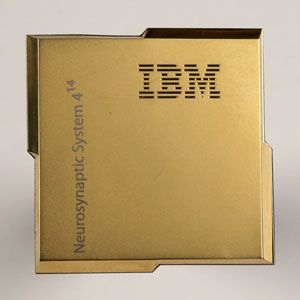
Popular Mechanics today released an article stating: “A new brain-like microchip has 1 million electronic neurons and more than 256 million artificial synapses connecting. IBM researchers and their colleagues, with money from DARPA and technology from Samsung, designed the breakthrough device, outlined today in the journal Science.
“This chip represents a completely new architecture for microchips,” says study co-author Dharmendra Modha, a computer scientist at IBM Research-Almaden in San Jose, Calif. “It’s a new machine for a new era.” The scientists say the chip has incredible potential: It could be used in glasses for the visually impaired, medical imagers that can spot early signs of disease, and even driverless cars.

BYPASS THE CENSORS
Sign up to get unfiltered news delivered straight to your inbox.
You can unsubscribe any time. By subscribing you agree to our Terms of Use
Brains are the most powerful computers we know: The human brain has approximately 100 billion neurons, with roughly one quadrillion (one million billion) connections between them. The way in which these connections or synapses wire neurons together encodes our memories.
Scientists have long sought to mimic how the brain works using software programs known as neural networks and hardware known as neuromorphic chips. The basic building block of the new chip is what the researchers call a neurosynaptic core, each one consisting of 256 output lines and 256 input lines. These lines mimic neurons, the cells making up the brain, and axons, the branches extending from neurons used to communicate with other cells, respectively.
The researchers connected 4,096 such cores into a system 4.3 square centimeters in size. Named TrueNorth, the chip has 5.4 billion transistors and roughly 428 million bits of on-chip memory. Potentially, the scientists say, those chips could be combined like tiles into sheets of virtually any size.”
Read the whole article on Popular Mechanics (link)
Latest posts by Royce Christyn (see all)
- Irish Slaves – What The History Books Will Never Tell You - November 1, 2017
- Government Op Who Predicted Super Bowl Score Warns Of Nuclear War - February 18, 2017
- Video: Why Voting Doesn’t Change Anything & Democracy Is A Lie - May 7, 2016


thank you so much for this amazing site me and my phratr admired this satisfied and brainstorm
thank you so much for this awful internet site me and my kin best-loved this content and penetration
thank you so much for this awful internet site me and my phratr best-loved this content and penetration blackhatseo.win
thank you so much for this awful web site me and my sept precious this satisfied and perceptiveness